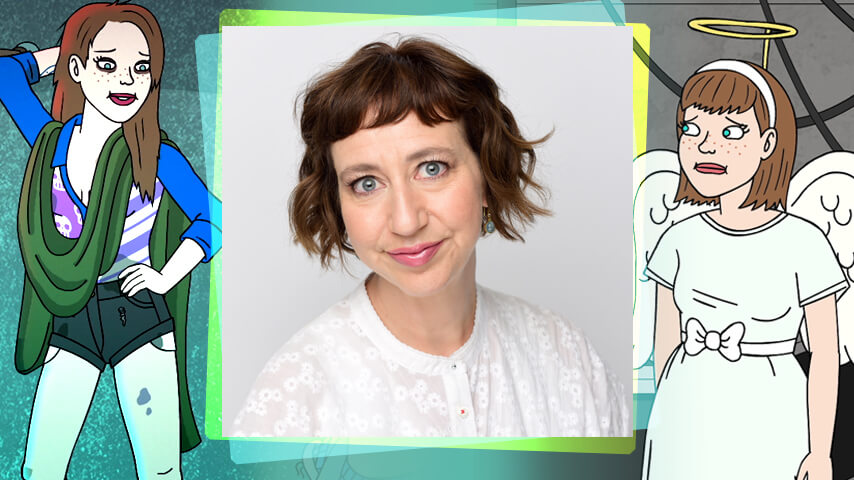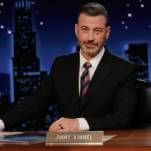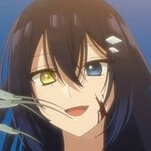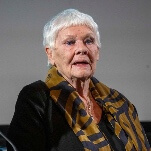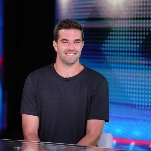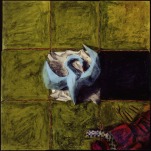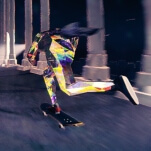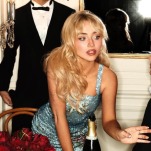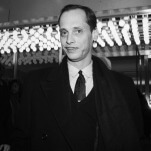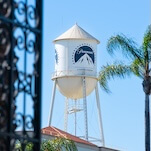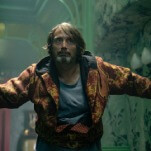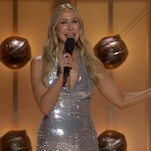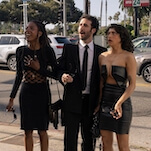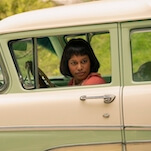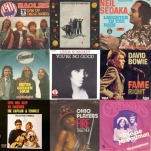Back in the 2010s, there was a very famous TV show, one that captured The A.V. Club‘s imagination for six seasons. As BoJack Horseman turns 10 this week, we’ll be looking back at the engrossing animated comedy with a series of essays and interviews. This is BoJack Horseman Week.
Kristen Schaal’s introduction in BoJack Horseman as an innocent kid initially seemed similar to her other notable voicework. Before joining Raphael Bob-Waksberg’s animated series as Sarah Lynn, the actor was known for voice roles like Bob’s Burgers’ Louise Belcher and Gravity Falls’ Mabel Pines. However, as BoJack quickly pulled the rug from under us, it became clear Sarah Lynn wasn’t just a cutesy character—she was a lost child star longing for true affection, ultimately finding comfort only in her addiction. Her time in Hollywood turned her into a troubled and tragic figure. She became an ideal conduit for the writers to satirize the industry and unpack its crushing effects on an impressionable young woman.
Sarah Lynn could’ve easily been relegated to a one-note or comical supporting figure from BoJack’s (Will Arnett) time in a famous ’90s TV show. Instead, her arc got an unforgettable conclusion. Schaal aces her character’s dualities by being self-assured yet plaintive, reminding us that despite her ostentatiousness, in the end, Sarah Lynn was just a heartbroken young woman. She’s the only actor from BoJack to secure a Primetime Emmy nomination (rightfully for season three’s gut-wrenching “That’s Too Much, Man”) throughout the show’s entire run.
“Sarah Lynn did start as a punchline and she ended as a punch in the gut, huh?” Schaal tells The A.V. Club of her evolution while revisiting her time on Netflix’s dramedy, which premiered a decade ago. To mark the occasion, Schaal walked down memory lane with us about securing her role, thinking about stars like Lindsay Lohan while performing, and if an animated series like BoJack Horseman could be made today.
The A.V. Club: Do you recall what drew you to BoJack Horseman and Sarah Lynn? How much did you know about her going in?
Kristen Schaal: I knew Raphael Bob-Waksberg because we were all doing improv at the Peoples Improv Theater in New York City. I also knew [production designer and producer] Lisa Hanawalt well and was very familiar with her designs, so it just seemed like the perfect fit. I thought Will Arnett as BoJack was such a good call, right? My reaction was that I didn’t know what it would be but it felt like such a good narrative about depression, even though it’s a horse who’s a Hollywood star. But the way they tackle it all is so accessible universally. I think they nailed it. I also didn’t know what Sarah Lynn’s story was going to be. At first, she was just a kid in his old sitcom, so I was just trying to play to that.
AVC: At the time, did Sarah Lynn feel different from your other well-known voice performances because of the nature of BoJack? Was it an exciting challenge?
KS: Oh, definitely. I would say Sarah Lynn is probably the most realistic, grounded, animated character I’ve ever played. She’s the most human if that makes sense. So, that was exciting. At first, it’s shooting off sitcom jokes and learning she’s a mess. She’s funny and entitled, and then all of a sudden, the layers are coming down, and you’re seeing that she’s a troubled human being. It was a big gift to get to be able to perform that type of character and do it in such creative ways. The storytelling really used the medium of animation well, like when BoJack goes into that hallucination musical number. There are also so many great set pieces.
AVC: Did you get to see what Sarah Lynn looked like before you started voicing her? Does it help get into character at all?
KS: Yeah, I think they did show me a picture. It helps get into character a bit but it’s always going to be about what the emotion on the page is. It’s interesting to think about it though. Does the picture change the way you perform? I think maybe it does to see what Sarah Lynn is wearing or what her eyes are like. It did, I guess.
AVC: When we meet Sarah Lynn as a child, she’s playing Sabrina, and as a young adult, she’s a big pop star singing songs like “Prickly Muffin.” What was it like to play these various versions of her?
KS: Well, first of all, when I get asked to perform songs, it’s the scariest day for me. [Laughs.] It’s not in my comfort zone, but that song was so funny. It was fun to just be a pop star and to go from being innocent to jaded like that. BoJack did that a lot, like even with Princess Carolyn (Amy Sedaris), who was always chasing love, which is the wrong game in Hollywood. But I still feel like Sarah Lynn deep down was the same character throughout. I did all my scenes with Raphael. He directed me and he would be sort of my scene partner, too. He set up Sarah Lynn to get exactly what he wanted from that story so it also felt satisfying.
AVC: What was the actual process of recording with Raphael like? Did you feel like you were able to hone something you didn’t know about voice acting at that point?
KS: It was good. It was in a little booth, almost like a steel shed booth in an office and I could see Raphael through a tiny window. As for recording it, and I get this way with Mabel and Louise too, but I love these characters. But with Sarah Lynn, it got to a much more raw place than I’m used to going in animation. I learned that it’s possible in the genre to do that. I felt that about the show in general. I was inspired by it. My husband and I were like, “Do you want to write an animated show like BoJack?” There was something so beautiful about watching it because people connected to it on a deeper level. It happens with animation, you can project yourself onto this cartoon and drawing. With BoJack, it’s surreal and silly but it’s also dark and important. So I would watch it and just go, “Oh, you can do that.” And the audience’s reaction to it, oh my gosh, they were feeling it too. They weren’t rejecting it even when it was talking about things like depression and addiction. It was feeding them in a way that felt really good.
AVC: Were there any scenes or episodes that particularly excited you in terms of Sarah Lynn’s comedic dialogue delivery?
KS: Oh my God, didn’t she say “Suck a dick, dumb shit,” a lot? I’ve seen that everywhere. You can get a mug and t-shirt that says “Suck a dick, dumb shit.” [Laughs]. I can’t believe it.
AVC: Sarah Lynn’s journey feels so relevant even today as we see child stars opening up about what they’ve been through. What was it like to read and play the tragic parts of her story?
KS: Yeah, I feel like that happens to so many women in showbiz. I thought about Lindsay Lohan the whole time because she was so bullied in the media. I remember this stupid thing I was looking at where she was on the red carpet and she had black nail polish that was peeling. A magazine or whatever it was magnified her nails to talk about what a disaster she was. And it seemed like everyone else liked that and this is the story they were waiting to see about how she’s failing. We’ve lived through this type of picking, especially women. Why are we doing that? I think we’ve turned a corner a bit, but I’ve seen a lot of that thing around me. It’s a copycat story that happens over and over with women. A lot of them have climbed out of it. I think BoJack handled these stories well, even with the Me Too plot. It could only go to these deep, dark, and intimate places because it is an animation series.
AVC: From the beginning, the writing foreshadows what’s going to happen to Sarah Lynn. Did you ever think at any point, “Oh, maybe they’ll let her live?”
KS: No, I didn’t have any expectations. I would just get called in when they wanted Sarah Lynn to be in an episode. I also didn’t always know what the rest of the episodes were going to be like until I was taken in. When I found out Sarah Lynn was going to die, I was sad about it because I’m very protective of all the characters I play. I mean, they’re all weirdos, but they’re perfect, you know? When Raphael told me she was going to die, I embraced it because it’s another thing about BoJack that makes it unique. Usually, animated shows might not go there and kill off a character. Once again, I thought they were breaking new ground.
AVC: What was it like to film “That’s Too Much, Man” and see the reaction from everyone?
KS: It was still just me and Raphael but it was really good and sad. One of the last lines she says about being an architect was just so honest and raw. It was a reminder that death isn’t what we see on TV. It’s not some huge scene, it can be quiet and gentle. So I went in, recorded, ate a candy bar, and then I left. I mean, it was still heavy and dark, but then I think about how animation is such a collaborative work. For me, I think seeing the whole thing done with the drawings, the color, the music, the planetarium, that’s also what made it feel real.
AVC: How do you view Sarah Lynn’s evolution from being a sitcom punchline to where she ended up?
KS: Oh wow. Yeah, thanks for highlighting that. That’s totally true. She did start as a punchline and she ended as a punch in the gut, huh? I’m so thrilled that I got to be Sarah Lynn and let her story evolve in such a beautiful, sad way. I don’t usually get to do that, so I continue to feel honored and happy that they trusted me with her.
AVC: As someone who’s done several animated shows over the years, do you think a TV show like BoJack Horseman can be made today when it’s harder and harder to get a longer lifespan?
KS: I think it could but I do feel grateful to have gotten on animated shows like Bob’s Burgers, which needed time to find its audience. We were lucky enough to be graced with all these seasons so our audience can grow. I think all sitcoms, but especially animation, need that because it takes so much time and money to make. So to see it get scrapped quickly is heartbreaking. But I do think it’s possible to have something like that even if like the Wild Wild West out there now.
